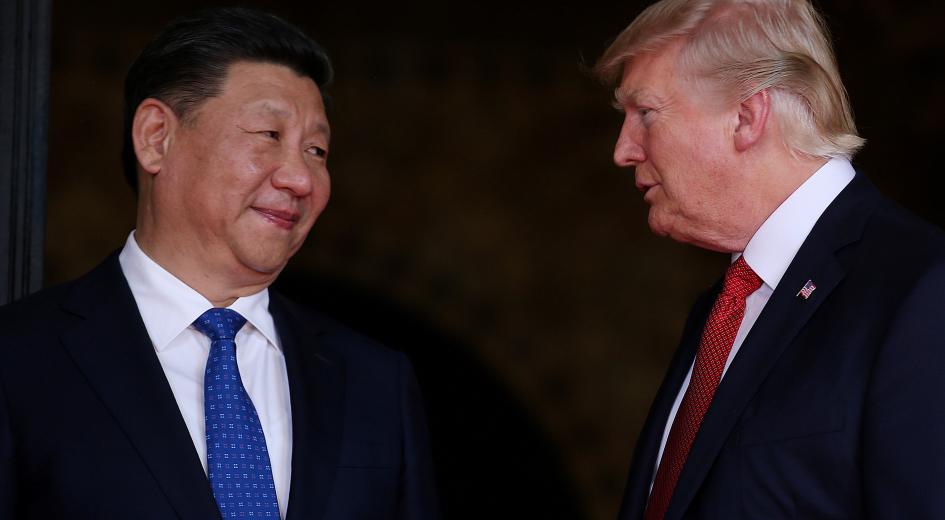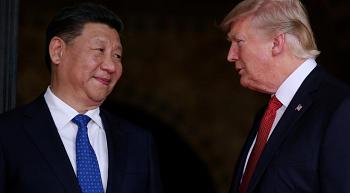Emerging US-China relations – An essay
1. Introduction
USA and its arch foes like Russia and China can never be true friends, let alone allies in any true sense but they maintain business relations and as powerful veto members they cooperate and coordinate their secret operations globally.
USA under Donald Trump who has already proved to be its new rouge president without any sense of discipline by unilaterally declaring Jerusalem to be the second capital of fascist Israel that regularly drink Palestinian blood as part of US-Israeli agenda, cannot be expected to be a “friend” of China or Russia, notwithstanding his rhetoric in that direction: he only advances US national interest by pretending to be a great admirer of Putin and Xi and interestingly these former communist regimes also just pretend to take him to be a serious ‘peace maker’.
China sells its goods to USA but buys very little of US goods and takes its help for business deals in Afghanistan, Iraq, and elsewhere. China remains the major customer of Russian terror goods and technology.
US policy
One of the major foreign policy goals of USA has been to disrupt and spoil the strong Russo-China relations. Americans go about the job very systematically. have achieved their Cold War target of dismantling the powerful Soviet Union and Socialist system of East Europe- considered to be the chief foe of capitalism and imperialism but in the post Cold war era the ever growing Sino-Russian military ties have caused worries even for the US Neocons that focus on sustaining the US militarism as the chief tool of foreign policy and destabilizing any power that challenges US supremacy.
For decades and under many presidencies USA found it futile to waste resources and energy to make Russia and China fight each other in wars, it first pretended to be supporter of new Russian capitalist economics but when it was amply clear that Russia cannot be bent so long as former KGB officer Vladimir Putin is in control, it cleverly forged strong economic ties with Beijing only to criticize later Beijing for “dumping” the Chinese ‘wastes’ in USA.
Today, China on the move to bring entire world to promote its economy through One Belt program but since China does it by peaceful and persuasive ways, USA cannot protest. In fact USA has made enormous success in making entire world work for its capitalist agenda even much before the One Belt project was launched to being entire world and economies closer to China. But Washington feels uneasy about the Chinese plan to counter it.
In fact, China’s ever rising economy worries Americans so badly that they have to pretend to be friends with Beijing and try to cause a possible drift in Sino-Russian relations.
Notwithstanding state crimes against its own citizens on terrorism plank, USA keeps talking about human right violation in Russia and China as if everything is normal in other countries, but these days in order to gain maximum from China, Americans do not talk about “deficit” of human rights in China although colossal violations do take place in China especially in the Islamic Xinjiang region.
Even Chinese mixed system does not tolerate Islam in Xinjiang and does not allow freedom of Islamic religious practices, evincing regular prayers and fasting during the Holy Ramadan.
Decoding the visit
US President Trump’s official visit as part his Asian shuttle tour has brought to focus on Sino-American relations. The second time this year, Trump met with his Chinese counterpart President Xi woefully unprepared. As was true when Trump prematurely hosted Xi Jinping at Mar-a-Lago, his Florida resort, in March, US policy toward China remains unformulated and uncoordinated. Departments and Cabinet officials are still running their own plays often at times in direct tension with one another.
All the while, US policy is subject to the whims of an unpredictable and unscripted president whose rhetoric on China swings back and forth like an old-fashioned metronome.
Without a coherent China policy, much less a strategy for implementing it, Trump regime officials have been hard-pressed to explain why the president was going to Beijing at all. Not so for China as to why it wanted to receive him. Xi was coming off his coronation at the Communist Party’s twice-a-decade Congress, a lavish celebration of his consolidation of power. And Trump’s visit can only help him boos this global image. .
In Beijing, the two leaders representing West and East respectively might have been able to paper over the cracks by unveiling a few energy deals, but that would only be a "calm before the storm" and the "escalation of tensions" next year. The Trump government has high expectations from China, a fundamental reordering of the trade relationship, while China expects a relatively painless negotiation process.
Obviously Trump went to China to get President XI on US board to target North Korea and coerce him to support US cause against a close Chin ally. Trump could not achieve the objective mainly because China is not Pakistan destabilized by US led NATO forces that still occupy that Islamic nation.
US decides international relationships
US coercive diplomacy always gets what the Americans want. Consider the US-Japan relations. USA uses its first atomic bombs to attack Japan, destroying a lot of places and killing thousands of innocent Japanese citizens. But soon after the WW-II, USA made plan to bring Japan under US control by launching the Cold war and NATO against Soviet Union and Communism-Socialism. Japan was made to play important role to protect it from any future Soviet attack. Te Cold war arrangement made by USA has remained intact thus far even after the end of Cold war and Communist-Socialist system. .
Unlike China- North Korean close ties, even the US-South Korea relations have not been a very stable and Trump’s previous comments disparaging the US-Korea free trade agreement and accusing Seoul of appeasing North Korea and not pulling its weight in the alliance.
The partnership between China and the USA, in which each nation regards the other as a potential adversary as well as an economic partner, has been described by world leaders and academics as the world's most important bilateral relationship of the century- outweighing even US-Russia relations.
For most of the 22 years between 1949 and 1971, Sino-US relations were uniformly hostile, with Mao Zedong frequently referring to the USA as "the most dangerous imperialist power", and the USA frequently attacked by Chinese propaganda in the worst manner.
Later, President Kennedy believed that US policy towards China was "nonsensical", and he considered reestablishing diplomatic ties in his second term. However, Kennedy's assassination in late 1963, followed by the Vietnam War and China’s Cultural Revolution, ended any possibility of normalized relations with Beijing for years.
Despite this official non-recognition, the USA and China held 136 meetings at the ambassadorial level.
(Moe to follow)
Comments
There are 0 comments on this post













